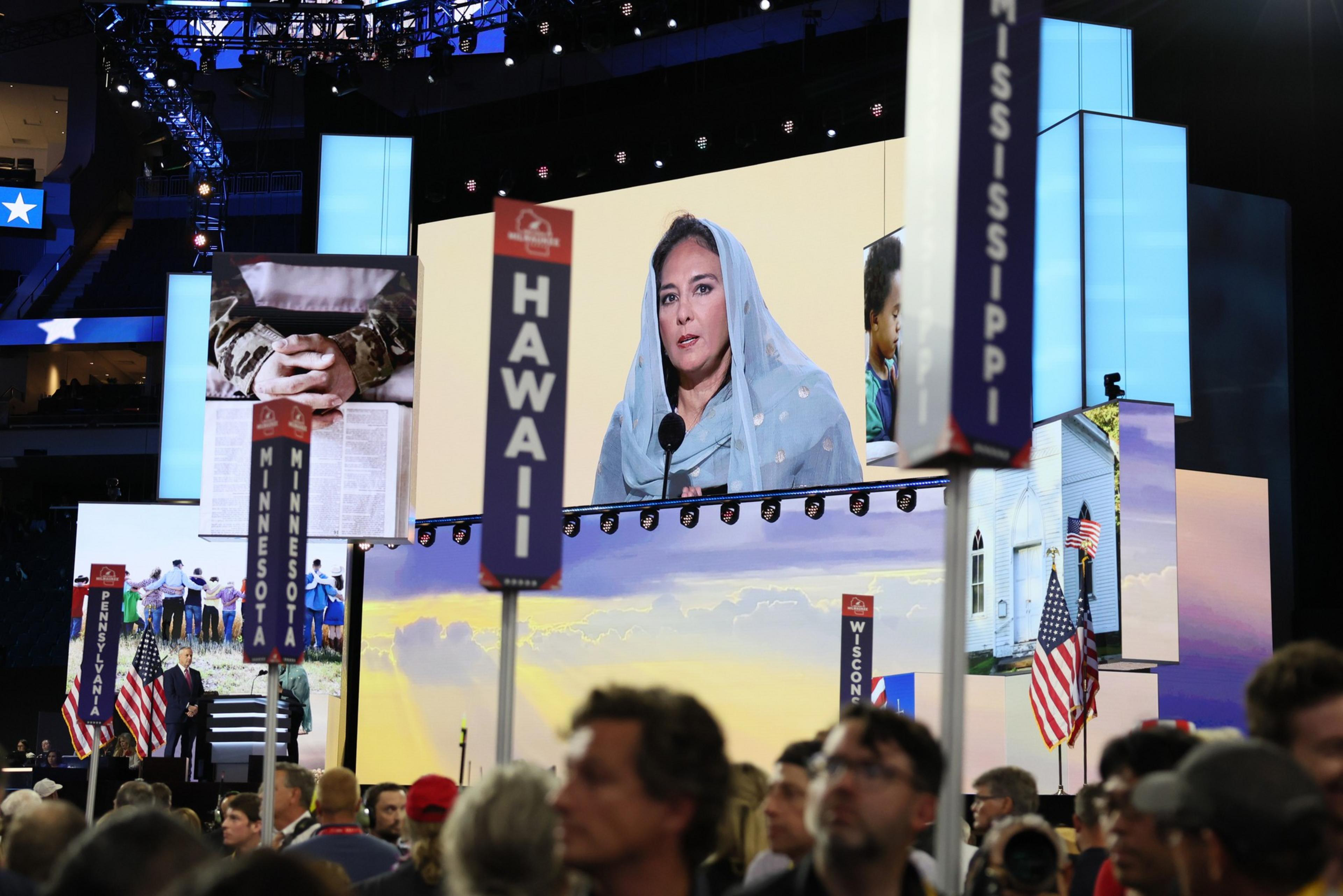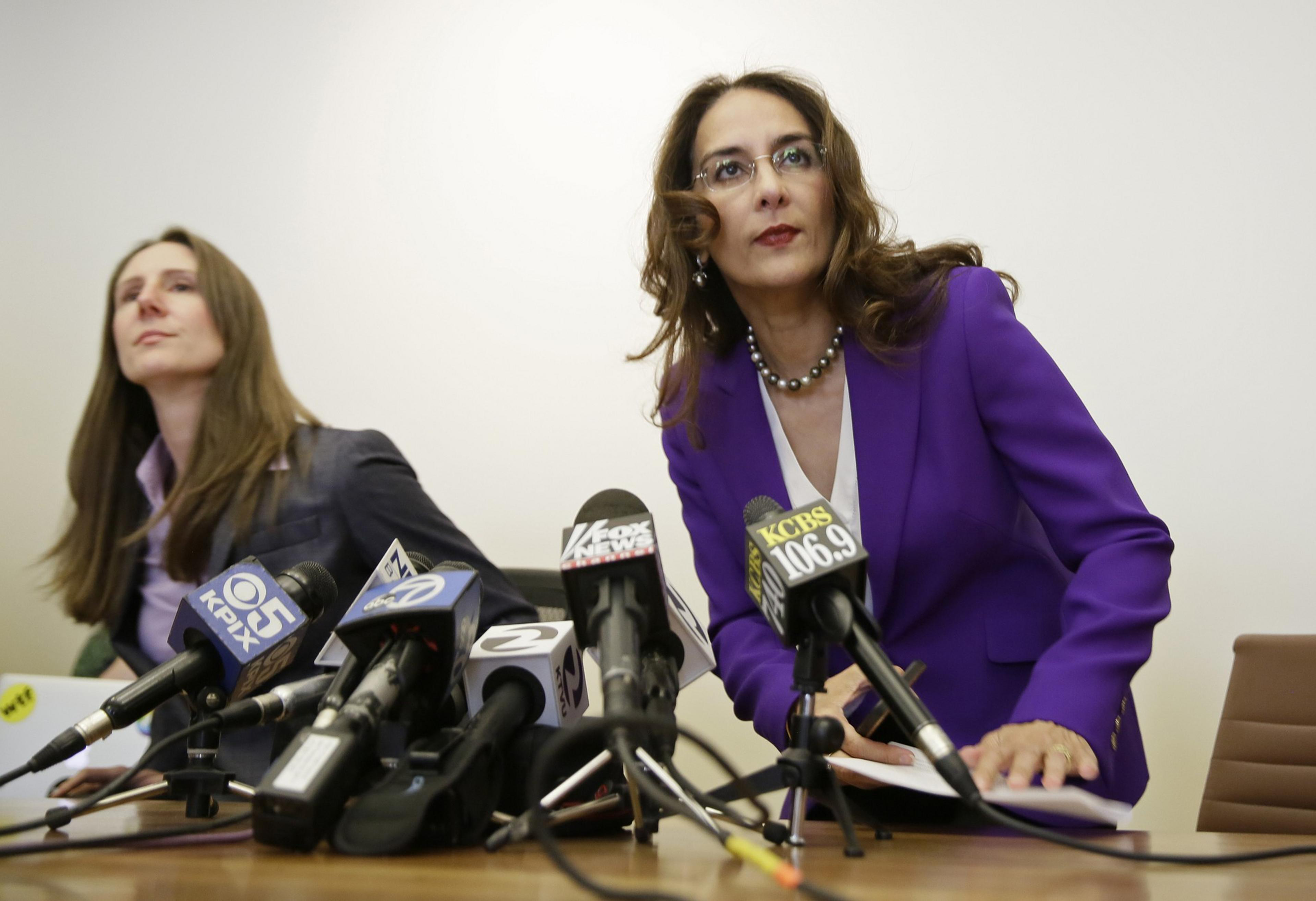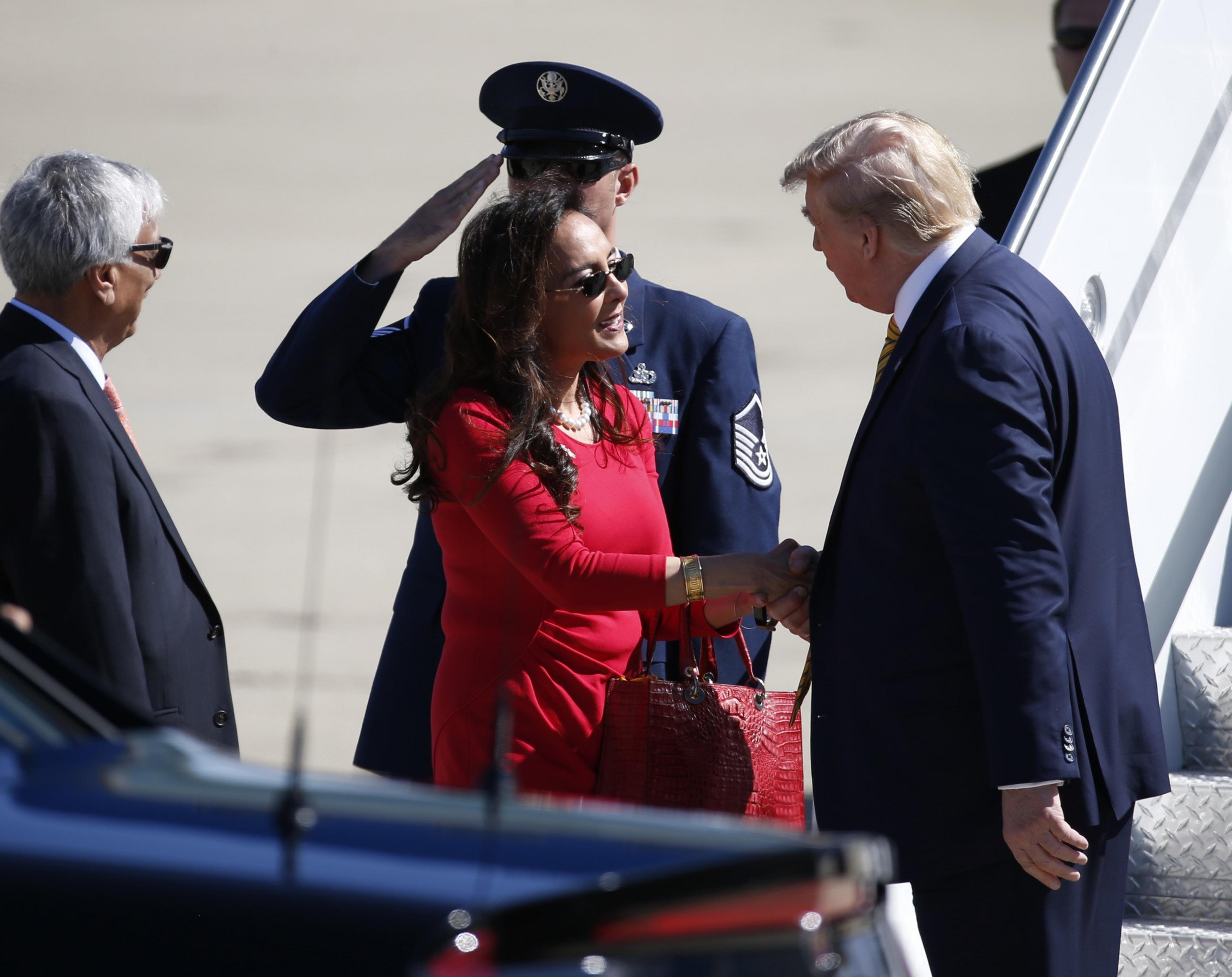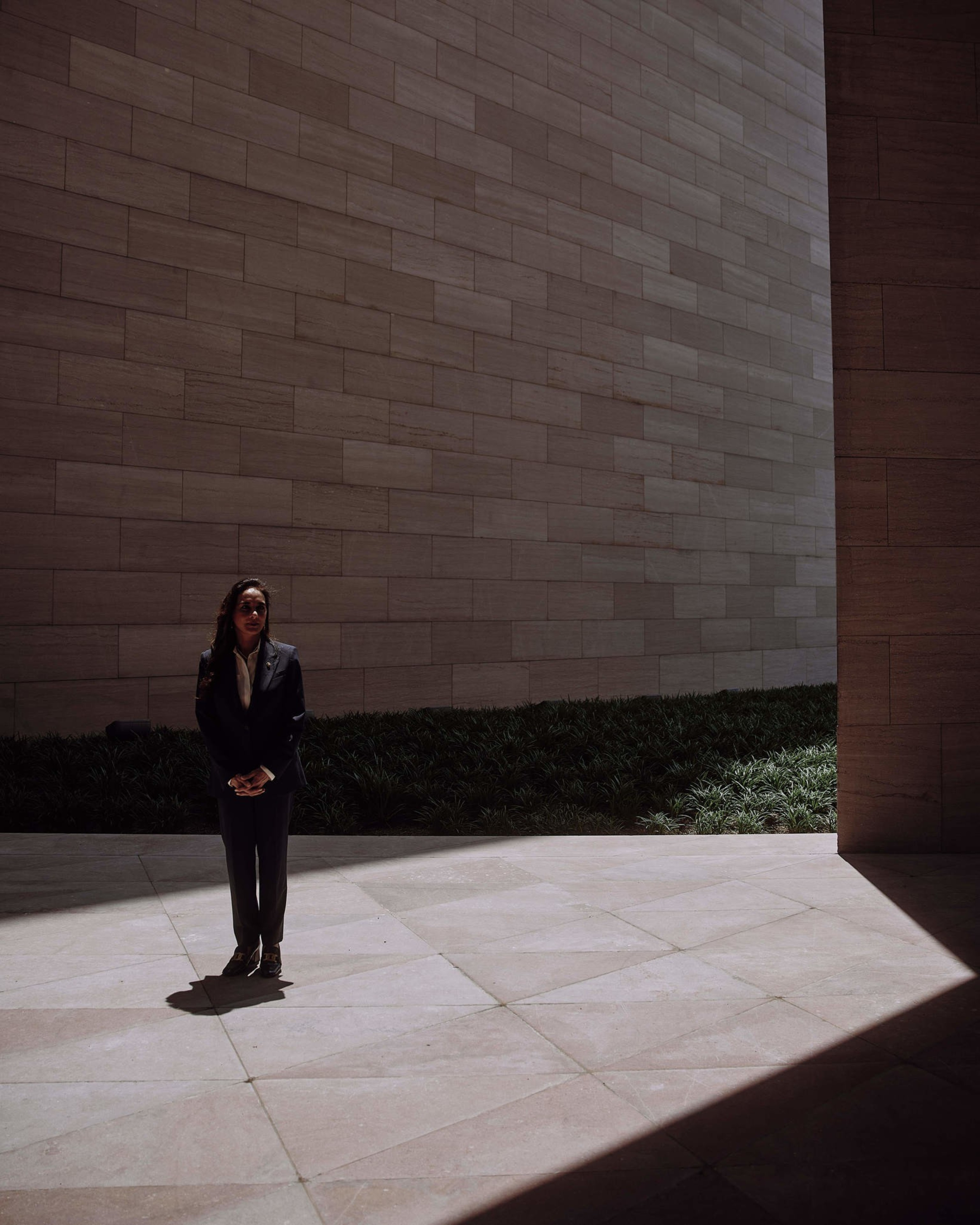Harmeet Dhillon knows the sting of bigotry.
Three days after an assassin’s bullet clipped Donald Trump’s ear at a presidential campaign rally last summer, Dhillon, a conservative lawyer and party leader, appeared onstage at the Republican National Convention, where she recited the Ardās, a Sikh prayer. Many in the crowd clapped, and one woman shouted “We love you, Harmeet!” But her mention of the “one true God” in remarks kicked off an avalanche of online abuse and accusations of blasphemy. One right-wing social media influencer calling the incantation “witchcraft” and a “lovely decorated word salad for ‘Hail Satan.’”
There was also the time in early 2023 when Dhillon, an Indian American immigrant, lost a race for chair of the Republican National Committee after a whisper campaign vilified her religion. An insider whipping up votes for another candidate sent an email saying Dhillon did not have a “Judeo-Christian worldview” and would never align with the party platform or with conservatism in general.
Asked about the attacks, Dhillon is matter-of-fact.
“I’m a big girl. Racism is a factor throughout all societies, and I don’t have a victim mentality,” Dhillon said. “There’s always going to be haters in the world. But as my mom would say, throw a stone at every barking dog, and you’ll never reach your destination.”

It’s an answer that’s unsurprising to anyone who knows Dhillon — a battle-tested culture warrior who relishes public combat — but somewhat startling coming from the top official at the Justice Department’s Civil Rights Division, whose mission is to exterminate the barking dogs of illegal discrimination on the basis of race, sex, religion, and other protected classes.
Appointed to that role by Trump, Dhillon has wasted no time flipping the script on civil rights in the U.S. It’s a mission few in San Francisco saw coming almost two decades ago, when Dhillon was known as a conservative attorney who had political aspirations but was collegial with Democrats. Following 9/11 and a rise in anti-Sikh attacks, Dhillon even served two years on the board of the American Civil Liberties Union, which ardently defends the First Amendment and other rights and liberties but is commonly viewed as aligned with the left.
“During that period of time, I always found Harmeet to be a really pleasant person, smart and very moderate, very middle of the road, even lefty on some issues,” said Democratic state Sen. Scott Wiener.
But over the last decade, Dhillon has undergone an aggressive shift as she rose up the ranks of the state and national Republican Party and began filing lawsuits with what Steve Bannon might call “muzzle velocity.”
Since 2016, Dhillon has sued UC Berkeley for attempting to suppress the speech of young Republicans on campus; Google for firing an engineer who criticized the company’s “ideological echo chamber” at the outset of the MeToo movement; the city of San Jose for its laissez-faire approach to mob violence against Trump supporters; antifa protesters in Portland who roughed up Andy Ngo, a right-wing influencer; Gov. Gavin Newsom and California’s early pandemic restrictions; states that attempted to block Trump from appearing on the 2020 ballot; and Kaiser Permanente for providing gender hormone therapies and surgeries to a teen who later de-transitioned.

Dhillon, 56, also represented Tucker Carlson (opens in new tab) after he was fired by Fox, bringing her time as a frequent guest commentator on the network to an end.
Her tenacious TV interviews defending Trump and attacking all comers on the left — she appeared on Fox hundreds of times — likely endeared her to the president, who himself became a client in 2020. While not all of the legal battles Dhillon has led ended in victory, they often resulted in settlement agreements and concessions that equated to a win. And if there is something that both Dhillon and Trump value above all else, it’s winning.
It’s what drew Dhillon to Trump in 2016 at the urging of her husband, Sarv Randhawa, who died last August after suffering from cancer and Parkinson’s disease.
“As a lifetime Republican,” Dhillon said, “that’s the main consideration: How’s my party going to win? And how are we going to win the House and the Senate? Who’s the strongest person to be at the top of the ticket? It isn’t so much about personalities. It’s about the ability to win.”
After his election victory in November, Trump tapped Dhillon as assistant attorney general overseeing civil rights — a job she was denied during his first term — and her appointment was confirmed in April. Dhillon is now deeply embedded in the president’s inner circle and is inarguably equipped to implement Trump’s culture wars.
“The president’s views,” Dhillon said, “are my views.”

The political football
Upon taking over the Civil Rights Division, Dhillon issued a new mission statement (opens in new tab) laying out a radically different vision for its work, which has traditionally focused on police misconduct, LGBTQ+ rights, and ensuring that Black and other minority communities have equal access to education, housing, and voting. One of her first memos reportedly pledged “the full dedication of this section’s resources, attention and energy to the priorities of the president.”
“They wanted to continue ‘defund the police’ type work, which we aren’t in the business of anymore,” Dhillon told The Standard. “They wanted to impose their own definitions of the Americans with Disabilities Act on businesses. And you know, we aren’t doing that. We aren’t making up new laws here.”
Dhillon’s arrival coincided with hundreds of attorneys leaving the division. Resignations and early retirements have reportedly accounted for a 70% reduction in staff (opens in new tab). The losses have not slowed the work, Dhillon said. In the last two months, Dhillon has launched investigations looking into “illegal” diversity, equity, and inclusion initiatives, as well as religious intolerance — particularly around anti-Christian bias, hate crimes and allegations of antisemitism. And her gaze has now turned toward the banishment of transgender girls from youth sports.

Jon Fleischman, the conservative author of the Flash Report (opens in new tab), said the Civil Rights Division’s priorities change with each president. Dhillon’s prowess as an attorney should help the Trump administration capitalize on the way Democrats fumbled last year’s election.
“The Civil Rights Division is kind of a political football, because the way that you interpret and enforce civil rights in America can be very different depending on the philosophy of who’s doing the enforcing,” Fleischman said. “So on one hand, you’re going to have an administration that says the civil rights of a transgender person are being violated if they’re not able to participate in a sport. And now, the civil rights of women are being violated if they’re forced to compete with somebody whose biological sex is of a different gender. You know, it flips it on its head.”
Dhillon bristled when asked if the issue of transgender athletes has been overblown and weaponized by Republicans. Studies suggest that less than 1% of U.S. high school athletes are transgender.
“The whole purpose of Title IX was to give girls equal opportunity, and girls are being robbed of their equal opportunity by boys taking their trophies,” Dhillon said. “It’s very obvious that’s a civil rights violation.”
She added, “It affects thousands of girls, it affects millions of girls.”
On May 21, just ahead of the fifth anniversary of the murder of George Floyd, the Justice Department announced that it was canceling its police reform settlement with Minneapolis (opens in new tab), as well as one with Louisville prompted by the police killing of Breonna Taylor. Dhillon told reporters at the time that “federal micromanagement of local police should be a rare exception, and not the norm.”
The most consequential actions Dhillion could take in her new role might involve state voting laws. Her office has already taken action or announced interest in election matters in Alabama, North Carolina, Oregon, and Wisconsin. Dhillon said she intends to use the might of her office and federal law to “clean up the voter rolls,” though it’s too early to say how her approach will affect next year’s midterm elections or the 2028 presidential race.
“Our job is not to make sure one party or the other wins,” Dhillon said. “It is to make sure that the voting laws are equally and fairly administered and that everyone has confidence in the outcome of the elections.”

Months before Dhillon’s confirmation hearing, the Department of Justice dropped a case that challenged Georgia’s voting restrictions, which included making it illegal to provide assistance or direction to someone waiting in line at a polling station. The comedy series “Curb Your Enthusiasm” lampooned the law when Larry David’s character was arrested for giving a bottle of water to a parched woman (opens in new tab) who was waiting to vote.
Dhillon described the show’s depiction of the law as “a really dumb oversimplification.”
“It is about giving people items while they are within a certain distance of the voting booth, and it has to do mainly with not giving them voting-related propaganda, branded propaganda, and so forth,” she said.
Stacey Young, a DOJ attorney of 18 years who worked in the Civil Rights Division before resigning in January, told The Standard that Dhillon’s agenda is “the definition of politicization and weaponization.”
“She made it clear that the division is going to focus on voter fraud, which is largely a political fiction,” said Young, who launched the Justice Connection (opens in new tab), a nonprofit consisting of former DOJ attorneys. “Focusing on voter fraud means there are going to be many more people denied access to the vote, and there’s going to be less oversight over whether Americans’ votes matter.”
The warrior princess
To interview Dhillon is to feel sympathy for the attorneys who’ve faced her in a cross-examination or deposition. She contests and dismisses lines of questioning she doesn’t like with barely concealed contempt. “I don’t feel like, Friday afternoon at 5, I have the energy to go through my whole life story,” she said during the first of two lengthy, occasionally contentious interviews.

Mark Geragos, a famed Los Angeles attorney who leans left but became close friends with Dhillon after they sued California over its Covid restrictions, called Dhillon a “warrior princess” in the courtroom. At the end of the day, he said, all that matters to her is the result.
“And that’s a lesson at some point the Democratic Party is going to have to understand,” Geragos said.
Dhillon’s family immigrated to the States from India by way of England when she was a young child and she spent most of her childhood in Smithfield, a rural town in North Carolina where the Ku Klux Klan was not only active but advertised its presence on billboards. Residents frequently took note of her father and brother wearing turbans, as is tradition in the Sikh faith. Dhillon was smart and skipped a grade, putting an additional target on her back for teasing and bullying. But she grew up in a proud, conservative home — Dhillon is adamantly pro-life — where the family said daily prayers together and frequently discussed politics.
Her father was a surgeon and had a deep antipathy for litigious lawyers. Her mother volunteered as an election judge in Johnston County, North Carolina, on behalf of the Republican Party. Discussions would frequently touch on President Jimmy Carter’s tax policies and gas rationing, Dhillon said. The family hosted fundraisers for arch conservatives like the late U.S. Sen. Jesse Helms, who opposed the Civil Rights Act and the Voting Rights Act in the ’60s, as well as busing to desegregate public schools, and filibustered the establishment of Martin Luther King Jr. Day as a federal holiday.
Helms famously coined the term “reverse racism” — a refrain favored by Trump and his overwhelmingly white base — while fighting against affirmative action, and this appears to be a core tenet of Dhillon’s work.
“We’ve expanded civil rights enforcement to include all Americans, not just some Americans the prior administration thought it was their job to protect,” she said.

Dhillon’s links to some of the most vocal supporters of the Trump administration date back to her time attending Dartmouth College, where she edited the conservative newspaper The Dartmouth Review. Among those who preceded her at the student-run paper are right-wing political commentators Dinesh D’Souza and Laura Ingraham, both of whom Dhillon counts as friends. The paper frequently courted controversy for its aggressive rhetoric, including a satirical column under Dhillon’s leadership that compared the school’s Jewish president to Adolf Hitler for suppressing conservative speech on campus.
Dhillon noted that she went to a Jewish preschool and called herself “the most aggressive proponent of the Jewish community in the history” of the Civil Rights Division.
She went on to get a law degree at the University of Virginia and she moved to the Bay Area in 2000. Dhillon was working as an attorney and would eventually move to San Francisco to cash in on the tech boom. The famously liberal city has been an incubator for many of the conservative right’s leading culture warriors — venture capitalist Peter Thiel, Vice President JD Vance, and neo-reactionary thinker Curtis Yarvin, to name a few — and in many ways San Francisco served as the perfect training ground to hone Dhillon’s skills in taking on the left.
In 2006, two years after a second marriage ended in divorce, Dhillon decided to venture out by starting her own firm.
“I kind of wanted to focus on doing things my way, doing a lot of the work that I do that’s gotten in the national news,” Dhillon said.
During that time, Dhillon twice ran for the state Legislature — a 2008 run for the Assembly and a 2012 run for the Senate — and lost both times, as was expected in deep-blue San Francisco. In the intervening years, Dhillon became chair of the San Francisco Republican Party and quickly rose up the ladder of power for the California party, winning the vice chair role in 2013. She was the first woman and person of Indian origin to hold the position. She most recently served as the national committeewoman for California.
Jim Brulte and Shawn Steel, two former state party chairs, encouraged Dhillon early on to become a face of the California party as they tried to expand the tent beyond the traditional Republican image.
“I was well aware that we did pretty well with my demographic, slightly overweight men above 55 who were white,” Brulte said. “She immediately struck me as someone who was very serious, knew what she wanted to do with the party, and didn’t suffer fools.”
Bruising political campaigns would help Dhillon develop callouses to continue her climb, but her first campaign for state Assembly also led to meeting the love of her life.
Dhillon’s mother was serving as her campaign finance chair, and as a candidate, Dhillon leaned on support from the Sikh community. During a fundraiser in Raleigh, North Carolina, where Dhillon’s mother still lives, a guest suggested that Dhillon get in touch with their uncle, Sarv Randhawa, a retired nuclear engineer who at that time was on the board of KPFA, a liberal talk radio station in the Bay Area.
“He supported my campaign, and then after, we just started to spend more time together and became inseparable,” Dhillon said. “We were together for 16 years before he passed away.”
The couple lived on the famously crooked section of Lombard Street and would often go sailing in the bay in Randhawa’s boat, Pisces. In her free time, Dhillon is an avid knitter, gardner, and cook, but these activities do only so much to fill the void that Randhawa left.
“I feel like he would have approved of me supporting the Trump administration and serving my country,” Dhillon said. “Sometimes it’s sad, because you’re used to sharing it with somebody, and then there’s not somebody there. It can be sad at times. But it’s just part of life.”
The following month, Dhillon announced on Instagram that her father had died from pulmonary fibrosis. Matt Shupe, who handles PR for Dhillon’s law firm and the Center for American Liberty, a nonprofit she led to fund many of her lawsuits, said it’s rare for Dhillon to let her guard down.
“She is the most stone-cold killer I’ve ever met, by orders of magnitude,” he said.
“I probably spoke to her day to day more than almost anybody other than maybe [her husband], and I rarely saw an off switch. I think Sarv was her off switch.”
The blame game
Political violence poses the most serious threat to civil rights, and under Trump and Dhillon’s watch it seems almost certain to increase considering the current climate. Experts who document incidents of political violence say recent clashes — from the attack on the U.S. Capitol on Jan. 6, 2021, to multiple attempts on Trump’s life last year and shootings this month in Minnesota that killed a Democratic lawmaker and her husband — have reached a level not seen since the 1960s and early ’70s.
Dhillon said these incidents have “absolutely galvanized my determination to end political violence in this country.” But in the eyes of the nation’s top cop on civil rights, Democrats are mostly to blame for the bloodshed.
“There’s been Trump derangement syndrome since before President Trump was even elected,” Dhillon said. “It is, in my opinion, one-sided harassment that’s being normalized by Democrat lawmakers in this city and nationally. And it is shameful.”
Dhillon’s first brush with political violence happened on the day she met Trump, at one of his “Make America Great Again” rallies in June 2016. She and her late husband had gone to the San Jose McEnery Convention Center to hear Trump speak — Dhillon delivered the Pledge of Allegiance — and when she and others attempted to leave, they found an angry crowd waiting for them. In the previous months, Trump had used his rallies to inflame the political rhetoric and encourage his own supporters to assault and eject protestors.
Choice words between Trump supporters and protesters quickly devolved into skirmishes on several blocks of downtown San Jose (opens in new tab). People driving out of the venue’s garage had their lights kicked in, while Trump supporters on foot were berated, chased, and beaten. A woman in a Trump jersey was swarmed by one of the convention center’s exits and pelted with eggs.



Dhillon, her husband, and a friend who now works in the Trump administration ran to a nearby hotel for safety, making it inside just before staff locked the doors.
“Police stood there and watched people from teenage to 70s being assaulted by a violent mob,” Dhillon said. “That is the first day that I personally witnessed political violence in America and saw my government — my California government that I pay taxes toward — stand there and enable it.”
How the Justice Department intends to deal with escalating protests and conflicts over Trump’s policies — perhaps most notably immigration raids and warrantless arrests — is a question that could determine Dhillon’s civil rights legacy. Millions took to the streets for the “No Kings” protests on June 14, and of the many posts Dhillon sent out or retweeted that day on X, several were critical of the protests or discouraged people from attending.
Wiener, the state senator from San Francisco who has sparred with Dhillon and the Trump administration on numerous issues, recently introduced legislation that would ban federal law enforcement officers from wearing masks, sparking the latest war of words between him and Dhillon on social media. Dhillon fired off a tweet (opens in new tab) in response that Wiener should consult a lawyer to better understand the concept of preemption and the state’s limited legal authority over the federal government.
“The Harmeet that I knew 15 to 20 years ago would never have supported secret police who wear ski masks and grab people and put them into unmarked vans,” Wiener told The Standard. “When I say she is transforming the Civil Rights Division into the anti-civil rights division, this is what I’m talking about.”
